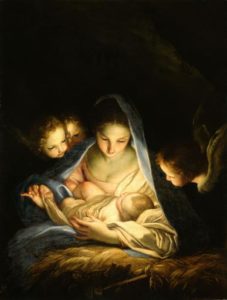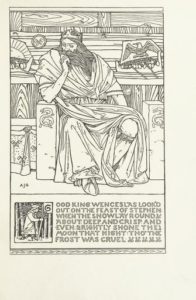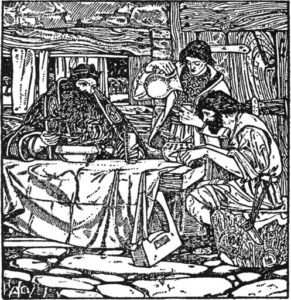Christmas hymns teach Scriptural Truth.
“You will go out in joy and be led forth in peace; the mountains and hills will burst into song before you, and all the trees of the field will clap their hands.” Isaiah 55.12
Scripture teaches the importance of singing hymns.
 At Creation, the angels sang (Job 38:6, 7). Deserts sing (Isaiah 35:1-2), as do the heavens and mountains (Isaiah 44:23; 49:13).
At Creation, the angels sang (Job 38:6, 7). Deserts sing (Isaiah 35:1-2), as do the heavens and mountains (Isaiah 44:23; 49:13).- In Heaven, music rings (Isaiah 51:11), angels sing (Isaiah 6:1-3), God Himself makes music (Zechariah 3:17; Revelation 5:13), and eternity will resound in song (Revelation 21, 22).
- At Jesus’ Incarnation, people and angels sang (Luke 1, 2). Entering Jerusalem, people sang “hosannas” and Jesus quoted psalms (hymns) at His own death (Matthew 27).
- Worship is our constant activity encompassing all aspects of a person and their life in devotion to The Lord Jesus. We honor God through our giftedness, committing our living service to Him (Exodus 26:1; 31:1-11; 35:30-36:1; 1 Chronicles 6:31-46; 16:1-42)
- Hymnology—variations of truth recorded musically—are to honor Jesus (Ephesians 5:19-20; Colossians 3:16).
 Linking hymns to history – the historic accounts of Scripture – helps Christians rehearse their faith. Singing reinforces our belief, reinstills commitment, revitalizes our spirits, renovates our thinking, and reconnects us to the community of God’s people.
Linking hymns to history – the historic accounts of Scripture – helps Christians rehearse their faith. Singing reinforces our belief, reinstills commitment, revitalizes our spirits, renovates our thinking, and reconnects us to the community of God’s people.
Four examples of Christmas hymns reawaken us to Scriptural Truth.
 O Holy Night links us to our need of redemption. “Long lay the world in sin and error pining.” What should be our response? The hymn writer concludes “Fall to your knees!” The apostle Paul said exactly the same thing after celebrating the mystery of the gospel disclosed in Jesus when he said, “For this reason, I fall to my knees before The Father…so that Christ may dwell in your hearts through faith” (Ephesians 3.14).
O Holy Night links us to our need of redemption. “Long lay the world in sin and error pining.” What should be our response? The hymn writer concludes “Fall to your knees!” The apostle Paul said exactly the same thing after celebrating the mystery of the gospel disclosed in Jesus when he said, “For this reason, I fall to my knees before The Father…so that Christ may dwell in your hearts through faith” (Ephesians 3.14).
 God Rest Ye Merry Gentlemen celebrates Satan’s defeat. “Christ our Savior, born on Christmas day, saves us all from Satan’s power when we were gone astray.” What better way to communicate the biblical truth of the apostle John’s statement, “The reason the Son of God appeared was to destroy the works of the devil” (1 John 3:8).
God Rest Ye Merry Gentlemen celebrates Satan’s defeat. “Christ our Savior, born on Christmas day, saves us all from Satan’s power when we were gone astray.” What better way to communicate the biblical truth of the apostle John’s statement, “The reason the Son of God appeared was to destroy the works of the devil” (1 John 3:8).
Joy to the World explains the emotional weight – JOY – that should be our response to “the Lord has come, let earth receive her king.” Doctor Luke records the angelic, royal announcement, “I bring you good news of great joy which shall be for all the people” (Luke 2:10).
 Good King Wenceslas tells us our response to Jesus’ birth should be giving. The song celebrates the Feast of Stephen, the day after Christmas. The Church was to give their leftovers to the poor. The last stanza records the event:
Good King Wenceslas tells us our response to Jesus’ birth should be giving. The song celebrates the Feast of Stephen, the day after Christmas. The Church was to give their leftovers to the poor. The last stanza records the event:
Therefore Christian men be sure
Wealth or rank possessing
Ye who now will bless the poor
Shall yourselves find blessing.
 The hymn clearly teaches what Jesus taught: what you do for the least of my brothers you do for me (Matthew 25:34-40).
The hymn clearly teaches what Jesus taught: what you do for the least of my brothers you do for me (Matthew 25:34-40).
“When I was hungry you gave me food, when I was thirsty you gave me drink, when I was a stranger you welcomed me, when I was naked you clothed me.”
Christmas hymns connect us to the most important event in human history: Jesus’ birth.
 Dr. Mark Eckel is President of The Comenius Institute (website), spends time with Christian young people in public university (1 minute video), hosts a weekly radio program with diverse groups of guests (1 minute video), interprets culture from a Christian vantage point (1 minute video), and teaches weekly at his church (video).
Dr. Mark Eckel is President of The Comenius Institute (website), spends time with Christian young people in public university (1 minute video), hosts a weekly radio program with diverse groups of guests (1 minute video), interprets culture from a Christian vantage point (1 minute video), and teaches weekly at his church (video).
Help Comenius reach its $40,000 giving goal this Christmas! The Comenius Institute [501(c)(3)] (website here) Donate online (here), mark@comeniusinstitute.org, (text/talk 630.303.4891) Checks to “The Comenius Institute,” c/o Collaborate 317, 4202 N EMS Blvd #180, Greenfield, IN 46140 And ask Mark what Comenius would do with $1 million!
Picture credit: SnappyGoat.com, en.wikipedia.org


